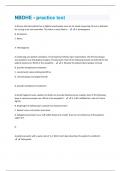Intercultural communication – BA1 term 4
Week 1: Lecture videos, Chapter 1, Chapter 2, Chapter 4
Week 2: Lecture videos, Chapter 6, Article, Podcast
-> ‘Who wants to feel white?’ Race, Dutch culture and contested identities
-> Podcast: Child Q
Week 3: Lecture videos, Article, Article
-> Reconsidering intercultural competence in the workplace: a dialectical approach
-> ‘If I’m going to teach about the world, I need to know the world’: developing Australian
pre-service teachers’ intercultural competence through international trips
Week 4: Lecture videos, Chapter 7, Chapter 8, Article
-> Why is cross-cultural management scholarship blind to power relations? Investigating
ethnicity, language, gender and religion in power laden contexts
Week 5: Lecture videos, Article, Article
-> Paralympic Athletes and ‘Knowing Disability’
-> Dominant discourses about race/ethnicity and gender in sport practice and performance
Week 6: Lecture videos, Article, Article
-> Banal Cosmopolitanism and The Lord of the Rings: the Limited Role of National
Differences in Global Media Consumption
-> Popular Culture and Public Imaginary: Disney vs. Chinese Stories of Mulan
Week 7: Lecture videos, Article, Article, Article
-> Issues and Challenges in intercultural Communication Scholarship
-> Dissonance and Decorousness: Missing Images of Syrian Women Refugees in the
Lebanese Media
-> Queer Intercultural Relationality: An Autoethnography of Asian–Black (Dis)Connections in
White Gay America
,Lecture week 1:
The conceptualization of intercultural communication:
1. Culture -> communication (your background influences your communication)
2. Communication -> culture (communication creating culture) (preferred in this course)
Central question in intercultural communication research:
Who makes culture relevant to whom in which context for which purposes?
1. Cross-cultural communication: studies start from an assumption of distinct cultural
groups and investigate aspects of their communicative practices comparatively
2. Intercultural communication: studies start from an assumption of cultural differences
between distinct cultural groups but study their communicative practices in
interaction with each other
3. Inter-discourse communication: studies avoids any a priori notions of cultural
identity. Instead, this approach asks how culture is made relevant in a text or
interaction and how cultural identity is brought into existence through text and talk
What is the use of culture?
-> answers the general research question.
What is the content of culture? -> What is it that culture comprises?
1. Culture as a national asset -> culture of a country; high culture like museums, popular
culture like cuisines
2. Culture as a challenge -> interpersonal communication; focus on interpersonal
relationships, for example in business advice
3. Culture as citizenship -> the basic unit of understanding culture; culture consisting of
practices that are seen as signifying as a particular identity
What is the scope of culture? -> What is considered the basic unit of culture?
= a cultural scope, like the nation; and people speak of national cultures (think of
introduction rounds in new classes)
What is the status of culture?
1. Entity (first way: culture -> communication) it treats culture as something people
have or to which they belong
2. Social construction (communication -> culture) it treats culture as something people
do, which they perform and compete over
Banal nationalism = nationalism as enacted and re-enacted daily in mundane, almost
unnoticeable banal ways -> everyday instances of banal nationalism socialize us into national
subjects who live in a world full of nation states. It hard to see unless you are paying
attention to noticing it.
Banal nationalism is flawed:
- Theoretically; it does not acknowledge the multiplicity of identities
, - Practically; nationality has lost some of the sway it once held in an age characterized
by globalization/ transnationalism
Discourse = ways of referring to or constructing knowledge about a
particular topic or practice. It produces certain ways of talking about a topic or practice or
restricts other ways of talking about them. In that sense, discourse constructs the topic /
practice, defines and produces them.
Chapter 1: Approaching Intercultural Communication
Studies in understanding intercultural communication:
1. Investigation of the ways in which British and Italian service staff on an airline
respond to failure. They behaved in the same way.
Service failure = when something goes wrong.
2. The ways in which Korean immigrant shopkeepers in Los Angeles interact with their
African-American customers.
3. The ways in which people who live in tourist destinations are being represented in
travel writing. They distinguished three different strategies:
1) Those people are referred to in very general turns, such as locals.
2) These groups are described as homogeneous and with clearly identifiable
attributes.
3) They are represented as ‘helpers’ to the tourist, like ‘hospitable locals’.
The researches are in three contexts: service work, convenience shopping and reading the
newspaper.
Inter-discourse approach asks how culture is made relevant in a text or interaction and how
cultural identity is brought into existence through text and talk. It avoids any priori notions
of cultural identity.
Culture can also appear as a verb -> to do culture.
The process view of culture is constructionist -> it treats culture as something people do,
which they perform, and, crucially, compete over.
Key points of chapter 1:
- Culture is not something that exists outside of and precedes intercultural
communication. Instead, communication is one domain where ‘culture’ as concerned
with the specific and different ways of life of different national and ethnic groups is
constructed.
- Culture is an ideological construct called into play by social actors to produce and
reproduce social categories and boundaries, and it must be the central research aim
of a critical approach to intercultural communication to understand the reasons,
forms and consequences of calling cultural difference into play.
Chapter 2: The Genealogy of Intercultural Communication
Week 1: Lecture videos, Chapter 1, Chapter 2, Chapter 4
Week 2: Lecture videos, Chapter 6, Article, Podcast
-> ‘Who wants to feel white?’ Race, Dutch culture and contested identities
-> Podcast: Child Q
Week 3: Lecture videos, Article, Article
-> Reconsidering intercultural competence in the workplace: a dialectical approach
-> ‘If I’m going to teach about the world, I need to know the world’: developing Australian
pre-service teachers’ intercultural competence through international trips
Week 4: Lecture videos, Chapter 7, Chapter 8, Article
-> Why is cross-cultural management scholarship blind to power relations? Investigating
ethnicity, language, gender and religion in power laden contexts
Week 5: Lecture videos, Article, Article
-> Paralympic Athletes and ‘Knowing Disability’
-> Dominant discourses about race/ethnicity and gender in sport practice and performance
Week 6: Lecture videos, Article, Article
-> Banal Cosmopolitanism and The Lord of the Rings: the Limited Role of National
Differences in Global Media Consumption
-> Popular Culture and Public Imaginary: Disney vs. Chinese Stories of Mulan
Week 7: Lecture videos, Article, Article, Article
-> Issues and Challenges in intercultural Communication Scholarship
-> Dissonance and Decorousness: Missing Images of Syrian Women Refugees in the
Lebanese Media
-> Queer Intercultural Relationality: An Autoethnography of Asian–Black (Dis)Connections in
White Gay America
,Lecture week 1:
The conceptualization of intercultural communication:
1. Culture -> communication (your background influences your communication)
2. Communication -> culture (communication creating culture) (preferred in this course)
Central question in intercultural communication research:
Who makes culture relevant to whom in which context for which purposes?
1. Cross-cultural communication: studies start from an assumption of distinct cultural
groups and investigate aspects of their communicative practices comparatively
2. Intercultural communication: studies start from an assumption of cultural differences
between distinct cultural groups but study their communicative practices in
interaction with each other
3. Inter-discourse communication: studies avoids any a priori notions of cultural
identity. Instead, this approach asks how culture is made relevant in a text or
interaction and how cultural identity is brought into existence through text and talk
What is the use of culture?
-> answers the general research question.
What is the content of culture? -> What is it that culture comprises?
1. Culture as a national asset -> culture of a country; high culture like museums, popular
culture like cuisines
2. Culture as a challenge -> interpersonal communication; focus on interpersonal
relationships, for example in business advice
3. Culture as citizenship -> the basic unit of understanding culture; culture consisting of
practices that are seen as signifying as a particular identity
What is the scope of culture? -> What is considered the basic unit of culture?
= a cultural scope, like the nation; and people speak of national cultures (think of
introduction rounds in new classes)
What is the status of culture?
1. Entity (first way: culture -> communication) it treats culture as something people
have or to which they belong
2. Social construction (communication -> culture) it treats culture as something people
do, which they perform and compete over
Banal nationalism = nationalism as enacted and re-enacted daily in mundane, almost
unnoticeable banal ways -> everyday instances of banal nationalism socialize us into national
subjects who live in a world full of nation states. It hard to see unless you are paying
attention to noticing it.
Banal nationalism is flawed:
- Theoretically; it does not acknowledge the multiplicity of identities
, - Practically; nationality has lost some of the sway it once held in an age characterized
by globalization/ transnationalism
Discourse = ways of referring to or constructing knowledge about a
particular topic or practice. It produces certain ways of talking about a topic or practice or
restricts other ways of talking about them. In that sense, discourse constructs the topic /
practice, defines and produces them.
Chapter 1: Approaching Intercultural Communication
Studies in understanding intercultural communication:
1. Investigation of the ways in which British and Italian service staff on an airline
respond to failure. They behaved in the same way.
Service failure = when something goes wrong.
2. The ways in which Korean immigrant shopkeepers in Los Angeles interact with their
African-American customers.
3. The ways in which people who live in tourist destinations are being represented in
travel writing. They distinguished three different strategies:
1) Those people are referred to in very general turns, such as locals.
2) These groups are described as homogeneous and with clearly identifiable
attributes.
3) They are represented as ‘helpers’ to the tourist, like ‘hospitable locals’.
The researches are in three contexts: service work, convenience shopping and reading the
newspaper.
Inter-discourse approach asks how culture is made relevant in a text or interaction and how
cultural identity is brought into existence through text and talk. It avoids any priori notions
of cultural identity.
Culture can also appear as a verb -> to do culture.
The process view of culture is constructionist -> it treats culture as something people do,
which they perform, and, crucially, compete over.
Key points of chapter 1:
- Culture is not something that exists outside of and precedes intercultural
communication. Instead, communication is one domain where ‘culture’ as concerned
with the specific and different ways of life of different national and ethnic groups is
constructed.
- Culture is an ideological construct called into play by social actors to produce and
reproduce social categories and boundaries, and it must be the central research aim
of a critical approach to intercultural communication to understand the reasons,
forms and consequences of calling cultural difference into play.
Chapter 2: The Genealogy of Intercultural Communication



